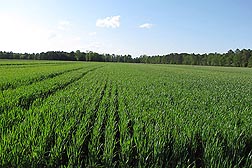| Read the magazine story to find out more. |
|
|
|
|
Wheat Varieties Make Way to Breads and Malt Beverages
By Sharon Durham
March 13, 2015
Two varieties of wheat, released for production in 2009 by a group led by a U.S. Department of Agriculture (USDA) scientist, have now become valued ingredients in products of two North Carolina businesses. Appalachian White and NuEast are being used in bread and beer.
Agricultural Research Service (ARS) research leader David Marshall, of the ARS Plant Science Research Unit in Raleigh, North Carolina, worked with collaborators at North Carolina State University to develop the two wheat varieties. NuEast is a hard red winter wheat and Appalachian White is a hard white winter wheat.
ARS is USDA’s chief intramural scientific research agency.
Mills and bakeries in North Carolina have used the wheat varieties in some of their products. The ARS unit has a long-running project with Carolina Ground, an artisan mill and bakery in Asheville, North Carolina. The bakery uses Appalachian White and NuEast in their artisan flours and baking recipes, according to Marshall.
Appalachian White is also in use by another local establishment, Riverbend Malt House—the first malt house in the eastern United States. The owners produce barley, wheat and rye malt, and their wheat malt is mainly made from Appalachian White wheat. The barley they use most is Thoroughbred, a 6-row barley developed and released by Virginia Polytechnic Institute and State University. Marshall is currently working with the malting industry on breeding a winter 2-row barley specifically for western North Carolina production.
The eastern United States is not hospitable to growing hard wheats, the type of wheat best suited for making breads and crackers, because the area’s humidity increases the incidence of disease in the fields. This in turn affects yield and quality of the grain. According to Marshall, NuEast has significantly higher grain yield than the check varieties over 4 years of field tests. It has good resistance to leaf rust and is moderately resistant to stem rust, including Ug99 races.
Read more about this research in the March 2015 issue of Agricultural Research magazine.

